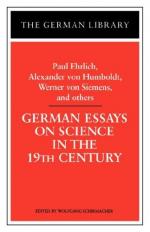|
This section contains 2,362 words (approx. 8 pages at 300 words per page) |

|
World of Microbiology and Immunology on Paul Ehrlich
Paul Ehrlich's pioneering experiments with cells and body tissue revealed the fundamental principles of the immune system and established the legitimacy of chemotherapy--the use of chemical drugs to treat disease. His discovery of a drug that cured syphilis saved many lives and demonstrated the potential of systematic drug research. Ehrlich's studies of dye reactions in blood cells helped establish hematology, the scientific field concerned with blood and blood-forming organs, as a recognized discipline. Many of the new terms he coined as a way to describe his innovative research, including "chemotherapy," are still in use. From 1877 to 1914, Ehrlich published 232 papers and books, won numerous awards, and received five honorary degrees. In 1908, Ehrlich received the Nobel Prize in medicine or physiology.
Ehrlich was born on March 14, 1854, in Strehlen, Silesia, once a part of Germany, but now a part of Poland known as Strzelin. He was the fourth child after three...
|
This section contains 2,362 words (approx. 8 pages at 300 words per page) |

|


